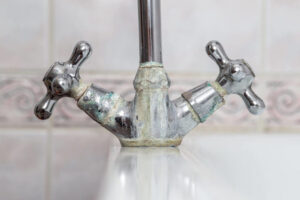Is Hot Water Taking Too Long to Get to Your Faucet?

How long do you wait for the water to get hot at the tap? 20 seconds? 45 seconds? A full minute? Whether filling a cooking pot or hopping in the shower, this waiting game wastes water and tries your patience every day. Why does it take so long for hot water to get to the faucet? And more importantly, how can you get hot water faster? Find the answers to your questions here.
7 Reasons Why it Takes So Long for the Water to get Hot
In most homes, several factors slow down hot water delivery. Consider some of the most common ones here.
- Cold water sitting in the pipes: When you run hot water for the first time in a while, what flows out first is the cold water that has been sitting there for hours. The water may be icy cold or room temperature, depending on the weather and where your pipes are located.
- Distance from the water heater: Before hot water can arrive, it must push all the cold water out of the way. The further it must travel from the water heater to the faucet, the longer this will take. For instance, if your water heater is in the basement, the second-story shower will take much longer to heat up than the basement bathroom faucet.
- Cold outdoor temperature: Your pipes are colder in the winter, which causes hot water to cool down as it flows toward the faucet. As a result, you may have to wait several more seconds for the water to get hot when it’s cold outside.
- Pipe diameter and thickness: Residential water supply lines are typically 1/4 to 2 inches in diameter. If your pipes are on the wider side, hot water will take longer to travel from point A to point B. Pipe thickness is another factor. In general, thicker pipes draw more heat from the water, causing a more significant cool-down while flowing toward the faucet.
- Low flow rate: Many modern plumbing fixtures, including faucets and showerheads, restrict the flow rate to conserve water. Unfortunately, this forces you to wait longer for hot water. The problem may be more noticeable if the fixture is also a long way from the water heater.
- Plumbing fixture leaks: Worn-out, single-handle faucets can leak cold water into the hot water stream. This can make it seem like the water is taking longer to heat up when in reality, it’s diluted with cold water.
- Sediment buildup: If your water is taking longer than usual to get hot, or you run out of hot water faster than you used to, the water heater could be to blame. Sediment buildup is one common problem. This is when minerals collect at the bottom of the water heater, insulating the tank against the gas burner or electric elements. As a result, the appliance works harder and takes longer to reheat your hot water supply. Higher water heating bills are another symptom of sediment buildup.
5 Ways to Get Hot Water Faster
Now that you understand some of the reasons for hot water delays, you can explore the best ways to fix them. Fortunately, there are several solutions to try.
- Insulate exposed plumbing: Foam pipe sleeves help prevent heat loss. This allows hot water to travel to the tap faster and keeps standing water hotter for longer. Insulate all exposed pipes you can easily access.
- Install a hot water recirculating pump: Over 10% of the hot water drawn for showering is wasted while waiting for hot water to arrive. A hot water recirculating pump eliminates this waste. It attaches to your water heater and circulates hot water throughout your pipes, making it instantly available, even at the most far-flung faucet. This device does not waste water and costs very little to operate, especially when running on a timer or thermostat.
- Replace your fixtures: If low flow rates are a problem, choose faucets and showerheads that use more gallons per minute. Just be aware that this could increase your water bill. If old, leaky faucets are to blame, install new O-rings or replace the fixtures entirely.
- Maintain your water heater: Prevent hot water issues and reduce water heating costs with regular water heater service. A plumber can help you spot minor concerns like sediment buildup or a corroded anode rod and perform the necessary maintenance before significant problems develop.
For more help figuring out why hot water takes too long to get to your faucet, reach out to Redfin Plumbing. We can determine the cause of your hot water woes and recommend the best remedies for your situation. Call us today at (346) 319-5342 or contact us online to learn more about our plumbing services. We proudly serve Houston, Cypress, Katy, Sugarland, Pearland, the Woodlands, Kingwood, and the surrounding Greater Houston area
